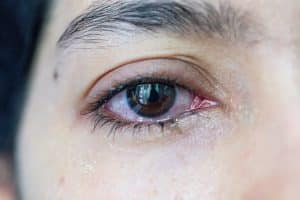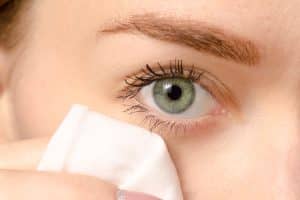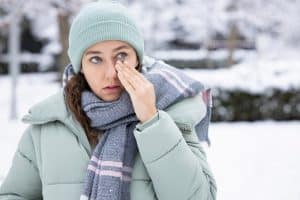Commonly more noticeable during the spring and summer months, hay fever is an allergy that affects lots of people. It causes a number of irritating effects, including congestion or runny noses, sneezing, coughing or itchy, reddened and watering eyes.[1] Sometimes this eye irritation can leave your eyes feeling very tired and heavy, which can have secondary impacts like impaired concentration, blurred vision and difficulty focusing.[2] Using eye drops may help to alleviate these side effects, but understanding hay fever can provide insights as well.
Keep reading to learn more about this common condition, including what causes it, how it can be managed and whether it is contagious.
What causes hay fever?
Hay fever is classed as an immune response, which means that it’s a reaction your body has to what it thinks are ‘invading pathogens’ – a.k.a. the germs that cause disease and illness.[1] Like other allergic reactions, hay fever is a condition where your body gets a bit confused and reacts to a harmless stimulus as though it’s dangerous. In this case, the stimulus or allergen is pollen released by trees, flowers and other plants. This is why hay fever is more common during the spring and summer, as plants are less active during the winter months.[3]
It’s not necessarily the case that you’ll be allergic to all kinds of pollen if you have hay fever. You may be allergic to tree pollen, grass pollen or weed pollen for example, and these types of pollen are often found at higher levels at different times of the year. Because of this, your friend who is allergic to tree pollen might have a runny nose and itchy eyes in the spring, while you have bouts of sneezing and watery eyes in the summer because you’re allergic to grass pollen.[4]
If you already have hay fever, you should be aware that the signs, including itchy, irritated eyes, can be made worse by contact with other irritants such as smoke, aerosols, fumes from cleaning solutions and air fresheners.[5] That’s because these irritants affect everyone, and can make you feel worse if you’re a little under the weather.
Due to hay fever having environmental causes – i.e. high levels of pollen in the air – many people find avoidance-based treatments can help. This can involve staying inside during times of high pollen, closing the windows to prevent pollen from coming inside and avoiding close contact with flowers wherever possible. Avoiding secondary irritants like those listed above may also help to keep the condition under control.
Some other treatment options aim to limit the allergic response by lightly suppressing your immune system – this includes medications such as antihistamines. Additionally, it can help to treat specific signs of hay fever in the meantime.[1] In the case of itchy, watering eyes, an ocular remedy such as TheraTears® Eye Drops for Irritation and Redness can help to alleviate the burning sensation. These eye drops contain Euphrasia to relieve redness and swelling, as well as hyaluronic acid to replenish your eyes’ natural moisture.
Not sure what treatment is best for your hay fever? Get expert advice specific to your situation by speaking with a pharmacist or your GP.
Is hay fever contagious?
As discussed, hay fever is not caused by infectious pathogens like bacteria or viruses – it is an allergic response caused by the presence of pollen in the air. Because of this, hay fever is not considered to be contagious, although it is a common condition that many people experience each year.[1]
Similar conditions that can look like hay fever include the common cold. Colds are contagious, and can be passed on through sneezes and coughs – both of which can be signs of hay fever. However, colds usually resolve themselves within a week or two, while hay fever typically lasts for as long as you are exposed to the allergen.[1,6]
Resources:
[1] https://www.nhs.uk/conditions/hay-fever/
[3] https://www.nhs.uk/conditions/allergies/
[4] https://www.allergyuk.org/types-of-allergies/hayfever/
[5] https://acaai.org/allergies/allergic-conditions/hay-fever/







